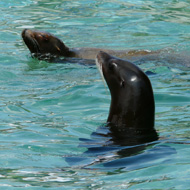Sea lions may hold clues to human cancer

Scientists from the Marine Mammal Centre want to find out what role the virus plays in the aggressive genital and uterine cancers seen in the California sea lion.
California sea lions could help scientists to explain how cancer attacks people and animals. By exploring the sea lion's high rate of cancer among wildlife, researchers hope to learn more about the interactions between genes, viruses and the environment, that trigger the disease.
Previous research has found that nearly 20 per cent of stranded adult sea lions that die have cancer. The cause of this prevalence is unknown, but a herpesvirus - OtHV1 - has been found in dead animals.
Now, scientists from the Marine Mammal Centre want to find out what role the virus plays in the aggressive genital and uterine cancers seen in the California sea lion - whether it is a cause or simply a benign virus. If scientists can understand how the virus causes cancer in sea lions, methods could be developed to stop it taking hold in human cells.
Past research has identified genes that seem to increase the species susceptibility to cancer. It is also thought pollution off the Pacific Coast may be weakening the animals' immune system.
Frances Gulland, senior scientist at the Marine Mammal Centre, told the National Geographic: "We want to know if contaminants - PCBs and DDTs - are suppressing the sea lion's response, and allowing the herpesvirus to colonise. We think that the contaminants decrease the ability of the immune system to function well. If you have a healthy immune system, you should be able to fight off disease."



 The Veterinary Medicines Directorate (VMD) is inviting applications from veterinary students to attend a one-week extramural studies (EMS) placement in July 2026.
The Veterinary Medicines Directorate (VMD) is inviting applications from veterinary students to attend a one-week extramural studies (EMS) placement in July 2026.